Exiled from Westboro: Leaving America's most hated church
Zach Phelps-Roper is the latest in a long line of defectors from Westboro Baptist Church. Now he's working to save the reviled anti-gay group — and himself.
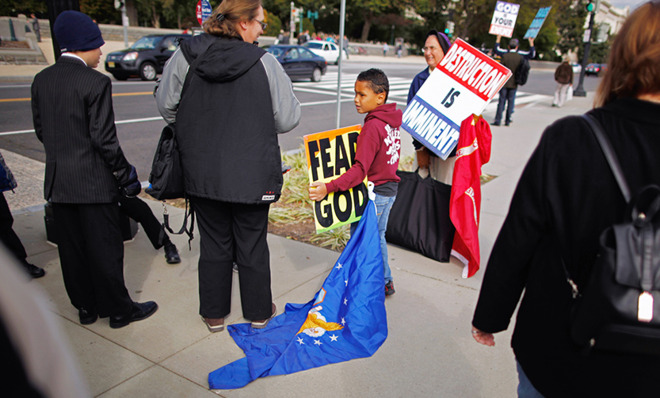
A free daily email with the biggest news stories of the day – and the best features from TheWeek.com
You are now subscribed
Your newsletter sign-up was successful

This summer, Zach Phelps-Roper could be seen on the streets of Topeka, Kansas, holding a sign above his head bearing the words, "You are beautiful." He was picketing the Westboro Baptist Church, arguably the most reviled religious organization in the country. "Please forgive them," he could be heard shouting, "for they know not what they do!"
Not long ago, Zach, 23, was holding an entirely different kind of picket sign. He is the grandson of the late Fred Phelps, Westboro's founder and spiritual leader. Phelps shaped the church's extreme zealotry and brazenly offensive anti-gay pickets, especially those staged at military funerals, where congregants of the church hold signs that read "God Hates Fags" and "Pray for More Dead Soldiers." The Southern Poverty Law Center has branded the church "the most obnoxious and rabid hate group in America." The media often refers to it as a cult.
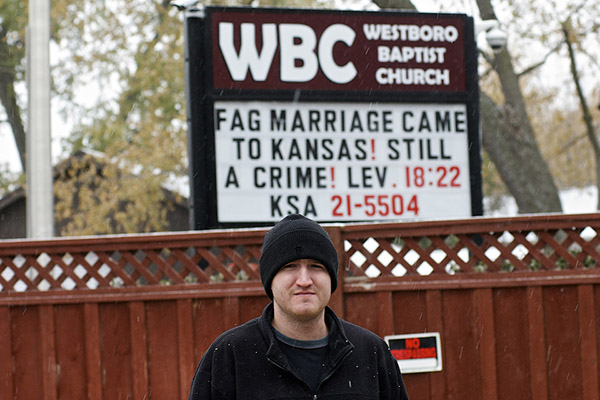
Zach Phelps-Roper outside the Westboro Baptist compound, his former home in Topeka, Kansas. He's one of at least 20 members to leave the church in the last decade, including his brother Josh and his sisters Megan and Grace. | (VOCATIV/MARK REINSTEIN)
The Week
Escape your echo chamber. Get the facts behind the news, plus analysis from multiple perspectives.

Sign up for The Week's Free Newsletters
From our morning news briefing to a weekly Good News Newsletter, get the best of The Week delivered directly to your inbox.
From our morning news briefing to a weekly Good News Newsletter, get the best of The Week delivered directly to your inbox.
This February, Zach, who was born and raised in the church, left Westboro, having suffered for weeks with a back injury his parents believed could be cured with prayer. After begging them to no avail to take him to the emergency room, he decided he was done being a martyr. "I don't love this religion anymore," he said.
In the eyes of the church, that declaration was an unforgivable offense worse than blasphemy. And it meant that Zach would be excommunicated. He knew he would never be able to talk to his parents again, and all traces of him would be scrubbed from his family's home and their place of worship. The congregation would classify him as an apostate who would spend eternity in hell.
Zach spent the night away from his house, and in the morning received a call from his father, who instructed him to come home and pick up his things. He arrived to find all his possessions dumped on the front porch: his bed, his clothes, his PlayStation and his prized movie collection, which was filled with boyish blockbusters like Jurassic Park and Teenage Mutant Ninja Turtles. But what stood out most was a photo album with snapshots of Zach, taken by his father over the course of 23 years. It was their single parting gesture. "I wanted to say goodbye to my parents," Zach recalls, "but they were gone."
***
A free daily email with the biggest news stories of the day – and the best features from TheWeek.com
Over the last decade, some 20 members have left the Westboro Baptist Church, Zach being the latest. The exodus suggests that the hate coalition created by Fred Phelps might finally, and permanently, be fracturing. There are now roughly 45 members, nearly all of them related by blood or marriage to Fred. They live near the church on a compound of some 20 houses that takes up an entire residential block. Every Sunday they congregate in the chapel for a late-morning service. The sermon is delivered by one of eight male pastors and generally amounts to a furious denunciation of homosexuality and all who tolerate it.
The church's obsession with homosexuality derives from Leviticus 18:22: "Thou shall not lie with mankind as womankind; it is an abomination." However, it is a common misconception that Westboro believes homosexuality is a worse sin than any other — murder, for instance, is just as bad. The difference is a matter of tolerance. Murder is outlawed, whereas homosexuality is not. Westboro focuses on the latter because of the belief that God compels them to do it.
Much of what the world perceives as anti-gay propaganda — the signs ("Fags Doom Nations"), the website (GodHatesFags.com) — Westboro considers an act of love. Members say they are following the Bible's orders by warning against sin. To be tolerant of homosexuality, or to even passively condemn it, is to defy God. And Westboro members, who believe the Bible is the literal word of a vengeful higher power, acutely fear the wrath of God.
Almost every day, church members picket around Topeka. Chief among their targets are religious institutions with leaders who are deemed false prophets or who have been critical of Westboro. Local government officials and activists who openly disagree with the church are also singled out. Then, of course, there are the pickets at funerals. In addition to showing up at the burials of American soldiers killed in combat (punishment for the U.S. government defending homosexuality, according to the church), Westboro likes to crash high-profile services that members link to America's tolerance of gays. In late 2012, for instance, Westboro planned to picket a funeral in Newtown, Connecticut, blaming the mass shooting there on the state's same-sex marriage law. Dozens of people, including a local biker gang, formed a human blockade to stop the protesters.
That such actions reap intense derision only reinforces Westboro's way of thinking. Unlike Christian evangelicals, Westboro's goal is not to convert the masses. In the church's view, the masses are already beyond saving. Members, most of whom were born into the church, are taught that they are the "elect," the tiny sliver of humankind going to heaven. Everyone else is going to hell.
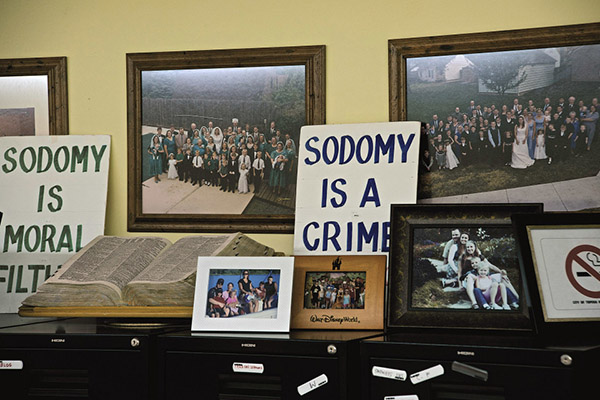
Anti-gay picket signs at a Westboro office. Church members believe they're saving homosexuals from God's wrath. | (VOCATIV/MARK REINSTEIN)
This insularity reinforces the members' belief that they are distinct from the rest of mankind and must protect themselves. Steven Hassan, an author who has extensively researched the subject of cults, refers to it as "phobia indoctrination." "It implies that if you leave, you'll be harmed," says Hassan. "What happens in people's minds is they can't imagine a positive experience [outside of the church]."
Yet the recent departures of church members suggests that life inside Westboro has become increasingly untenable, especially for young people. In 2011, the British documentary filmmaker Louis Theroux shot a movie called America's Most Hated Family in Crisis, a follow-up to his 2007 film about the Phelpses, The Most Hated Family in America. Zach's mother, Shirley, emerged as the obvious star of the series. Fiery and fanatical, with a high forehead and ecstatic blue eyes, she, of Fred Phelps' 13 children, best channeled her father's raging spirit. During pickets, her voice was the loudest. She could be heard screaming, "You love fags, you hate God, so just shut up."
Theroux interviewed several recent defectors, all young members in their 20s. None were Shirley's kids, but of her 11 children, her second oldest, a boy named Josh, had left more than five years earlier, never to be heard from again. During the film's last scene, Theroux pressed Shirley on the topic of excommunication. Perhaps the policy was too harsh?
"I always keep my eyes open and watch my children," she said. "And sometimes I see something in them that disturbs me. But…I have to stay on task. I have to be sure they know what their duty is, and they obey."
Two years later, in 2013, two of Shirley's daughters, Megan and Grace, decided to defect. Megan was 27, and Grace just 19. The former was Shirley's closest confidante. Zach says his mother was despondent. "She would go sit somewhere and cry. I can just remember seeing her in tears." He defected a year later.
***
One day in mid-November, I meet Zach in Topeka. He's been out of Westboro for nine months and is staying with another pair of ex-members who live near the compound. It's snowing, and a frigid wind whips off the prairies outside the city. He picks me up in his turquoise Pontiac; in the backseat is a mask from the movie Scream. "This was my first Halloween," he explains. "Westboro would say it's idolatry and very evil." He shrugs. "I discovered I love making jack-o'-lanterns."
Zach wears a black fleece, a winter hat and gray cargo pants. He is tall, with watery blue eyes, a pointy nose and a big frame that belies a childlike naïveté. When he sends text messages, he often includes smiling emoticons and hearts. He prefers to go to sleep by 9 in the evening so he can wake up early and play video games. Recently he began collecting glass animal figurines.
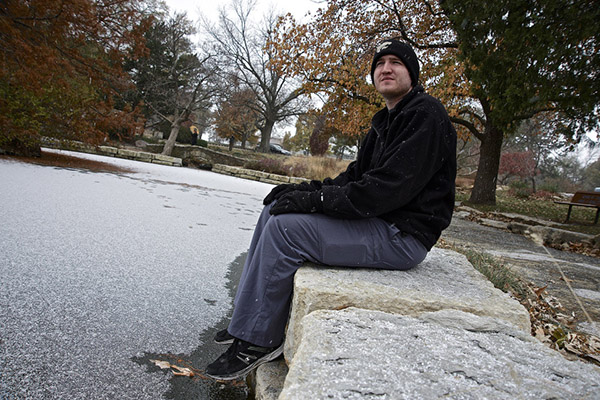
Zach Phelps-Roper at Gage Park in Topeka, Kansas, the site of the 1991 incident that caused his grandfather to start Westboro's campaign against homosexuals. | (VOCATIV/MARK REINSTEIN)
He steers the car toward Westboro and parks across the street. The church, which sits in a tidy residential neighborhood of one-story homes, is a small, rickety A-frame structure. An American flag hangs upside down from a post, signaling a country in extreme distress. A sign out front reads: "Fag Marriage Dooms Nations."
Next to the church is a vast yard protected by a high wooden fence. The yard, complete with a basketball court, swimming pool and tennis court, is the centerpiece of the compound, shared between roughly 20 households. Zach stares out the window silently for a few minutes. I ask him if he's OK. "I'm not tearing up," he says.
Zach grew up in an environment that was in some ways less isolated and strange than one might think. Like his siblings and cousins, he attended Topeka's public schools and was free to play video games and poke around the Internet. He listened to Fall Out Boy and My Chemical Romance and watched the Cartoon Network and Seinfeld (which his parents thought was funny, too). His mother affectionately called him "Zachy-pac."
Though friends weren't a part of Westboro children's lives, Zach never felt lonely. Fred Phelps alone had 54 grandchildren, and many of them lived within a block of one another. The kids had sleepovers, played sports and swam together. There were big family vacations to places like Hawaii and the Florida Keys, though all travel was under the pretense of church business: First you picket, then you go to the beach. "I definitely had a happy childhood," Zach says.
Much of it was spent in the service of the church. Zach spent at least an hour studying the Bible every day and regularly memorized scripture. He designed his own picket signs with phrases like "Planes Crash God Laughs" and "Fags Eat Poop," and attended pickets every day after school and before church on Sundays. Sometimes things got scary. "People would get really pissed," Zach recalls, noting how angry drivers would occasionally pelt them them with eggs and soft drinks. "One time a guy broke my placard in half with a skateboard."
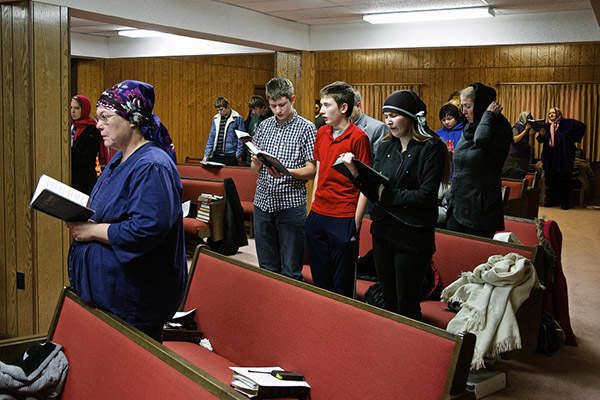
Sunday morning service at the Westboro Baptist Church. | (VOCATIV/MARK REINSTEIN)
Every Sunday, Zach would listen to his grandfather Fred Phelps preach the word of God. His style recalled the backwoods pastors of an earlier era, all hellfire and brimstone. Pulling from the most brutal passages of the Bible, Fred laid out his argument that God was ruthless, not loving. For as long as Zach had known him, Fred's primary focus was homosexuality. "The United States is a fag nation," he would often say during services. His warnings of impending destruction were often bizarre and accidentally comical. "You're going eat your babies!" he once said.
Fred died this March at the age of 84. His presence still lingers, and he left behind an incredibly complicated legacy.
***
Fred was born in Meridian, Mississippi, about 90 miles east of Jackson. He bore a slight resemblance to Clint Eastwood and liked to wear cowboy hats. When he was just 21, in 1951, he got his first taste of fame. He created a stir at John Muir College in Pasadena, California, by preaching to students against "promiscuous petting." Time magazine profiled him, and Fred kept a framed copy of that article on his office wall throughout his life.
In 1954, Fred and his wife, Margie, moved to Topeka, where he was hired as an associate pastor at the Eastside Baptist Church. Over the next two years, he gained a reputation as a thrilling preacher who conjured an atmosphere of controlled chaos. Eastside opened a second church in 1965 across town, in Westboro, and installed Fred as its leader. In a matter of weeks, he turned the church upside down.
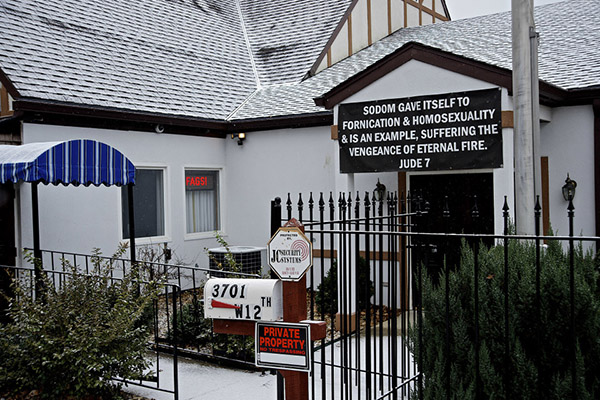
The Westboro Baptist compound. | (VOCATIV/MARK REINSTEIN)
Fred introduced his "hateful God" theory and showed himself to be harsh, mean-spirited and possibly unhinged. Fred's son Mark, who was the first of his children to defect, tells me that when a male congregant came to Fred for marital counseling, the pastor recommended he beat his wife, using the Bible as justification. Before long, Fred had chased away most of Westboro's members, leaving his family as his only audience.
At the same time, Fred, who'd put himself through Washburn University Law School, made a name for himself as a civil rights attorney, honored by the NAACP. Mark describes his work as sheer opportunism. "He used the N-word all the time," Mark says. "Many of his jokes were related to blacks. He defended them for the same reason he protested in public — he wanted the fame." (Fred was later disbarred for brutalizing a court clerk.)
One day in 1991, Fred was taking a walk with his grandsons in a local park when a man allegedly propositioned one of them. This turned Fred's focus to homosexuality, which became his singular obsession for the rest of his life. Claiming the park had been "taken over by sodomites," he arranged the church's first picket, which attracted enough attention to beget more. By the end of the 1990s, Fred's notoriety peaked when he showed up with his family at the funeral of Matthew Shepard, the gay 21-year-old who'd been tortured to death in a hate crime. But in 2005, his protesting of military funerals raised him to a new level of infamy. He called American soldiers "fag enablers."
Fred's son Mark, who is now 60 and lives in Orange County, California, left Westboro in the early '70s. Over the following years, three of his siblings would also leave, branded by the congregation as villains and heretics. Unlike Zach, they had to sneak away under the threat of extreme violence. Fred apparently had a habit of going after his children and physically returning them to his home.
This July, several months after his father's death, Mark began a blog called My Journey of Healing. In his telling — as well as those of his siblings who also defected — Fred was a mad sadist and a serial abuser. He flew into unpredictable rages and smashed up the kitchen. He beat his daughters with a leather shaving strap, and his sons with a mattock handle "about the weight of a baseball bat." "My father swung it with both hands like a baseball batter, with a full swing," Mark writes. Fred's wife faired no better. Once, "he threw her down the stairs, and as she was falling, she reached for something to catch herself and pulled her right arm out of the socket."
Fred's grandchildren, even the ones who have left Westboro, hold a very different view of their grandfather. "Gramps," as they lovingly called him, would sing to them on their birthdays. In an interview with the New York Post, Zach's cousin, Libby Phelps-Alvarez, characterized Fred as "a Southern gentleman." She said, "You just want to be in his orbit."
Mark is fully aware of this discrepancy. "It took me about 10 years until I was broken," he says. His younger brother Nate, also a defector, suffered from post-traumatic stress disorder.
This March, just before Fred's death, his son Nate made a shocking public announcement: In September 2013, Fred had been excommunicated from his own church. Zach had leaked the news to Nate, and now says his grandfather "had a change of heart" near the end of his life. Supposedly one of the elders caught him outside the church, calling to a band of activists who had moved in across the street. "You are good people!" he said, before being whisked back inside.
Zach says he knows the episode is true because he was present for the excommunication meeting, which took place in his parents' basement. After hearing the story, the members voted unanimously to kick out Westboro's spiritual leader and founder. For the last year of his life, Fred was barred from all church activities.
Zach holds up his grandfather as an example of how the church can rethink its views. In a Facebook post this May, Zach exclaimed, "I love my grandfather! And I believe people DO change, if they are inspired enough!"
***
After leaving the church, Zach went through long bouts of depression. He had difficulty sleeping and briefly contemplated suicide. "I felt like my life had no purpose," he says. He waited several months before publicly announcing his departure from Westboro, and through Facebook and Twitter he started to receive occasional messages of support from strangers, including a mental health nurse in her 40s. She encouraged him to rethink his interpretation of the Bible, but Zach was initially resistant, still fearing for the fate of his soul. The nurse, however, was a patient teacher, and pushed him to challenge his fixed ideas. "I remembered the quote, 'No peace for the wicked,'" he tells me. "I realized I was actually starting to find peace, even though Westboro would say I was wicked. I realized, OK, Westboro was literally wrong."
In May, as Zach told the world about his grandfather's "change of heart," he underwent his own spiritual transformation. "I had an epiphany," he recalls. In an interview with the Topeka Capital-Journal, he described his new perspective. "I feel like I have unconditional love for every person around the world," he said. "I feel like I have found the Holy Grail, the overarching solution to solving all of society's problems."
On his Twitter and Facebook pages, he offered his phone number to his followers, who are multiplying by the hundreds. "Call me if you're feeling bad," he instructed them. And in a Reddit AMA, he repeatedly implored participants to "treat the members of the WBC with LOVE!" He added, "Saying 'Fuck you' can easily be forgotten and it doesn't change their beliefs but only makes them feel validated."
During one of our conversations, I asked Zach what difference it would make if people treated Westboro "with love." He says, "Since they believe they're supposed to be hated, loving them would prove them wrong." And once the church realized they were wrong, he says, their entire belief system would collapse, and they would be forced to renounce their religious convictions; the policy of excommunication would fall by the wayside. They would, in other words, be "saved."
Compared with what it once was, Zach's life can seem lonely. He's close with his younger sister Grace, an arts student at Washburn, and he stays in touch with his sister Megan, a lawyer who now lives in South Dakota. His older brother Josh, who left the church a decade ago, lives an hour away, but after not speaking for years, they're only starting to get to know each other again. Zach maintains sporadic contact with other church defectors, like his uncles Mark and Nate. However, most of his time is spent with a tiny network of ex-members in Topeka, including two he currently stays with.
But mainly Zach is trying to adapt to the outside world. He's working as a nurse at a women's correctional facility, and he has joined a Unitarian church — he still believes in God, he says, but not in hell. He's also, for the first time in his life, developing friendships. Most of them take place over social media. He regularly communicates with people who've been following him online since he left the church. While we were together, a troubled gay teenager from New Mexico sent him a text message. "I haven't been well and just feel unappreciated," he said. Zach responded, "I see man," then asked how he could help.
As for real-life friends, so far he has one: a former high school classmate named Theo English, who happens to be gay. The three of us meet one day at a Topeka coffee shop. English, who wears a knitted dreadlock cap and a flannel shirt, flashes a bright smile. In some ways, he's taken on the role of mentor. When the two of them chat, Zach mostly nods and smiles, as if attempting to learn a new language. ("Theo taught me the word 'vanilla' as it pertains to sex," Zach tells me at one point. "It means you're not into kinky stuff.")
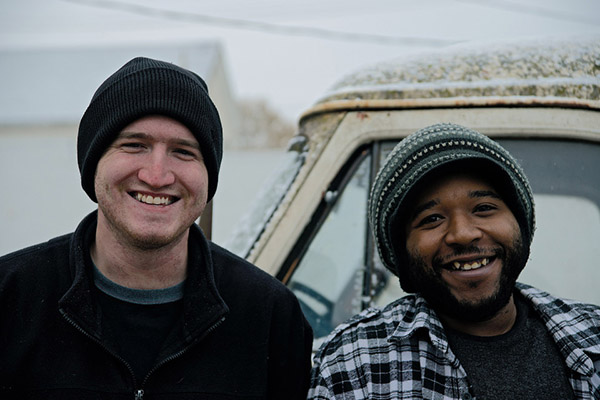
Zach Phelps-Roper and Theo English, a new friend who happens to be gay. English doesn't find their friendship strange at all. "Religion doesn't make you who you are," he says. | (VOCATIV/MARK REINSTEIN)
English works at a sex shop and likes to stay out late. "I was at a party last night, dressed as a sexy zebra," he says. "I got so drunk."
Zach looks at English sympathetically, and I ask him if he's ever been to a party before. He shakes his head vigorously and laughs. "Not ones he's been to," he says. "I'm usually asleep."
"I'm throwing one tonight," English mentions. "You should come, baby."
Zach's face turns red, and English asks him about the girl he's been talking to online. A few months ago, he drove 12 hours to meet her in her hometown in Alabama. "She held my hand," says Zach. "She gave me a hug. I said I didn't have any expectations." He texts her kissy emoticons and professes his love multiple times a day.
Zach isn't one for irony, so he doesn't have much to say when I press him about his friendship with English, a member of the group he was raised to hate. "What's done is done," he says. "I can't change the past — the person I was feels like a complete stranger to me now." The two connected earlier this summer, when English waited on Zach at a restaurant. Now Zach buys him lunch.
"I gave him my number and we started hanging out," English says, adding that it wasn't weird at all. "Religion doesn't make you who you are."
***
The next morning, Sunday, I attend a service at Westboro Baptist Church. Steve Drain, one of the pastors, ushers me inside. Thickset, with a mountain-man beard, Drain came to Westboro a decade ago to film a documentary about the church and wound up staying. As a pastor, he's one of the spiritual heirs to Fred Phelps.
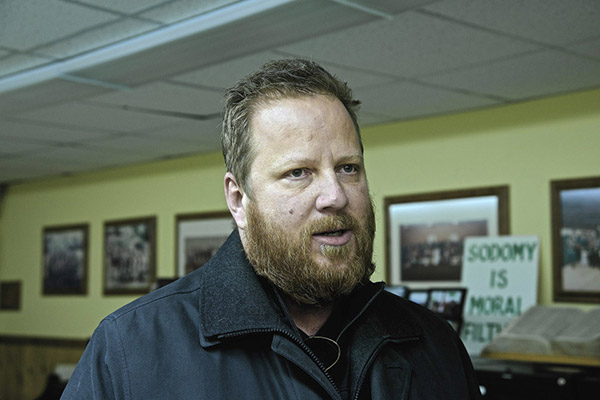
Steve Drain, a preacher at the Westboro Baptist Church. | (VOCATIV/MARK REINSTEIN)
I sit in the back of the chapel, which is about the size of a suburban basement, adorned with the sort of wood paneling that was popular in the '70s. When the service gets under way, there is an opening prayer and Fred Phelps Jr., the founder's first child, steps up to the lectern to deliver the day's sermon. Bespectacled and bald, he doesn't channel the rage of his father. He points out that while the world may change, and same-sex marriage may even come to Kansas, Christ will remain the same. And those who sin will ultimately face his judgment. "Don't you ever forget it, my sodomite friends," he concludes.
Afterward, I meet with Steve Drain in a small office off the chapel. Family photos cover the walls; none of them show Zach or his three siblings who defected. I ask Drain if it's true: Was Fred Phelps really excommunicated from the church? Had he really renounced his beliefs?
"I'm never going to confirm or deny anything about excommunication," he says. "But as far as the other thing goes? That's a bald-faced lie on Zach's part." He shakes his head. "He's trying to make sense of what he's done. He has to adapt to a cruel world now. Of course, I came from that world, and I know how cruel and dark it is."
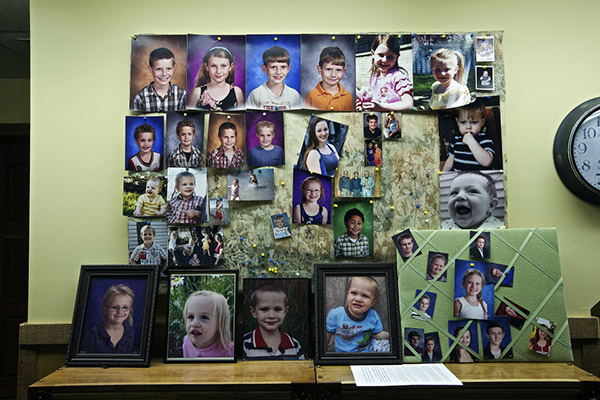
Photographs of children of Westboro. Pictures of Zach Phelps-Roper and his siblings were removed from the church once they left the group. | (VOCATIV/MARK REINSTEIN)
Later Zach picks me up at a McDonald's around the corner. He doesn't ask about the service; instead we discuss his future. "Besides marrying my girlfriend," he says, "my only other dream is being reunited with my family."
I'd spoken with his mother, Shirley, the day before, to arrange my visit to Westboro. Like many in the Phelps family, Shirley is an attorney. In 2011, she was a lead plaintiff in Snyder v. Phelps, in which Westboro argued, successfully, for the right to express members' views on the sidewalk — they'd been sued by the father of a dead Marine whose funeral they protested.
When we speak, I ask Shirley about Zach. "There's only one thing to say about that heartbreaking situation," she says. "He has blasphemed. I only care that he repent. If not, he will surely be destroyed with the rest of this nation."
"He wanted me to tell you he missed you."
"I'm absolutely certain he does miss me," she says. "He knew we loved him. But you have to decide: Do you serve God or the child?"
"Do you miss him?" I ask.
"It's irrelevant," she says. "God or the child?"
As we get closer to the airport, Zach asks, "Hey, did you ever speak to my mom?"
Before I can answer, he says, "I know she definitely misses me."
This article originally appeared at Vocativ.com: Exiled from Westboro: Leaving America's most hated church
More from Vocativ...


